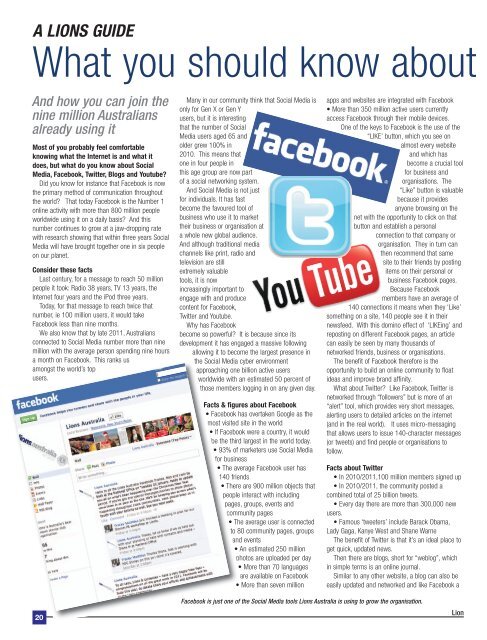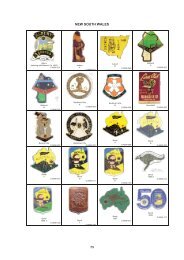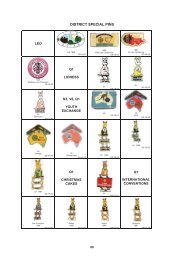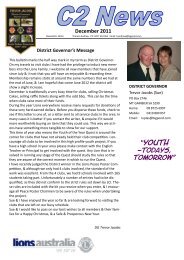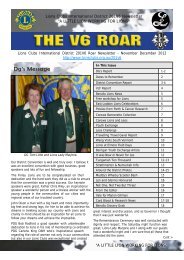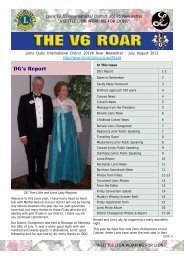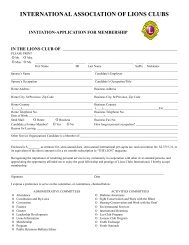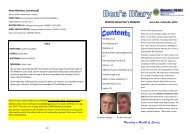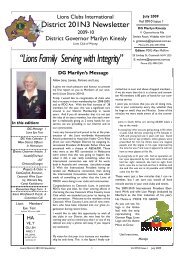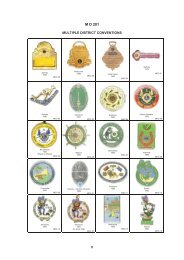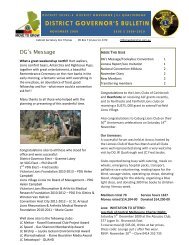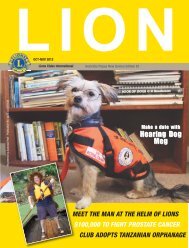2012 Feb - Lions Australia
2012 Feb - Lions Australia
2012 Feb - Lions Australia
Create successful ePaper yourself
Turn your PDF publications into a flip-book with our unique Google optimized e-Paper software.
A LIONS GUIDE<br />
What you should know about<br />
And how you can join the<br />
nine million <strong>Australia</strong>ns<br />
already using it<br />
Most of you probably feel comfortable<br />
knowing what the Internet is and what it<br />
does, but what do you know about Social<br />
Media, Facebook, Twitter, Blogs and Youtube?<br />
Did you know for instance that Facebook is now<br />
the primary method of communication throughout<br />
the world? That today Facebook is the Number 1<br />
online activity with more than 800 million people<br />
worldwide using it on a daily basis? And this<br />
number continues to grow at a jaw-dropping rate<br />
with research showing that within three years Social<br />
Media will have brought together one in six people<br />
on our planet.<br />
Consider these facts<br />
Last century, for a message to reach 50 million<br />
people it took: Radio 38 years, TV 13 years, the<br />
Internet four years and the iPod three years.<br />
Today, for that message to reach twice that<br />
number, ie 100 million users, it would take<br />
Facebook less than nine months.<br />
We also know that by late 2011, <strong>Australia</strong>ns<br />
connected to Social Media number more than nine<br />
million with the average person spending nine hours<br />
a month on Facebook. This ranks us<br />
amongst the world’s top<br />
users.<br />
20<br />
Many in our community think that Social Media is<br />
only for Gen X or Gen Y<br />
users, but it is interesting<br />
that the number of Social<br />
Media users aged 65 and<br />
older grew 100% in<br />
2010. This means that<br />
one in four people in<br />
this age group are now part<br />
of a social networking system.<br />
And Social Media is not just<br />
for individuals. It has fast<br />
become the favoured tool of<br />
business who use it to market<br />
their business or organisation at<br />
a whole new global audience.<br />
And although traditional media<br />
channels like print, radio and<br />
television are still<br />
extremely valuable<br />
tools, it is now<br />
increasingly important to<br />
engage with and produce<br />
content for Facebook,<br />
Twitter and Youtube.<br />
Why has Facebook<br />
become so powerful? It is because since its<br />
development it has engaged a massive following<br />
allowing it to become the largest presence in<br />
the Social Media cyber environment<br />
approaching one billion active users<br />
worldwide with an estimated 50 percent of<br />
those members logging in on any given day.<br />
Facts & figures about Facebook<br />
Facebook has overtaken Google as the<br />
most visited site in the world<br />
If Facebook were a country, it would<br />
be the third largest in the world today.<br />
93% of marketers use Social Media<br />
for business<br />
The average Facebook user has<br />
140 friends<br />
There are 900 million objects that<br />
people interact with including<br />
pages, groups, events and<br />
community pages<br />
The average user is connected<br />
to 80 community pages, groups<br />
and events<br />
An estimated 250 million<br />
photos are uploaded per day<br />
More than 70 languages<br />
are available on Facebook<br />
More than seven million<br />
apps and websites are integrated with Facebook<br />
More than 350 million active users currently<br />
access Facebook through their mobile devices.<br />
One of the keys to Facebook is the use of the<br />
“LIKE’ button, which you see on<br />
almost every website<br />
and which has<br />
become a crucial tool<br />
for business and<br />
organisations. The<br />
“Like” button is valuable<br />
because it provides<br />
anyone browsing on the<br />
net with the opportunity to click on that<br />
button and establish a personal<br />
connection to that company or<br />
organisation. They in turn can<br />
then recommend that same<br />
site to their friends by posting<br />
items on their personal or<br />
business Facebook pages.<br />
Because Facebook<br />
members have an average of<br />
140 connections it means when they ‘Like’<br />
something on a site, 140 people see it in their<br />
newsfeed. With this domino effect of ‘LIKEing’ and<br />
reposting on different Facebook pages, an article<br />
can easily be seen by many thousands of<br />
networked friends, business or organisations.<br />
The benefit of Facebook therefore is the<br />
opportunity to build an online community to float<br />
ideas and improve brand affinity.<br />
What about Twitter? Like Facebook, Twitter is<br />
networked through “followers” but is more of an<br />
“alert” tool, which provides very short messages,<br />
alerting users to detailed articles on the internet<br />
(and in the real world). It uses micro-messaging<br />
that allows users to issue 140-character messages<br />
(or tweets) and find people or organisations to<br />
follow.<br />
Facts about Twitter<br />
In 2010/2011,100 million members signed up<br />
In 2010/2011, the community posted a<br />
combined total of 25 billion tweets.<br />
Every day there are more than 300,000 new<br />
users.<br />
Famous ‘tweeters’ include Barack Obama,<br />
Lady Gaga, Kanye West and Shane Warne<br />
The benefit of Twitter is that it’s an ideal place to<br />
get quick, updated news.<br />
Then there are blogs, short for “weblog”, which<br />
in simple terms is an online journal.<br />
Similar to any other website, a blog can also be<br />
easily updated and networked and like Facebook a<br />
Facebook is just one of the Social Media tools <strong>Lions</strong> <strong>Australia</strong> is using to grow the organisation.<br />
Lion


